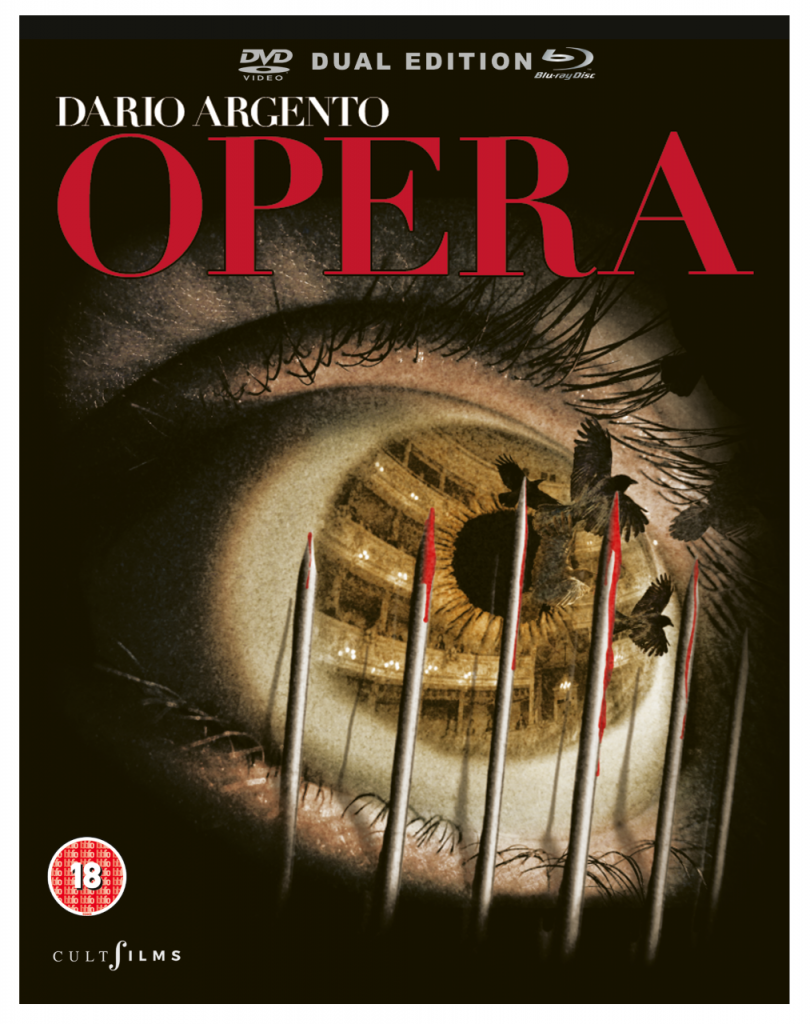

When people talk of ‘Opera’ most regard it as Argento’s last true masterpiece. Whilst of course this is completely subjective (and let’s be honest most of his more recent movies have been slated upon their initial release, only to develop some niche fans upon further releases) what people correctly refer to is that ‘Opera’ is the last of his movies to emphasise the artistic element to his movies rather than just simply telling a story.
The plot of this movie rather unsurprisingly uses an Italian contemporary production of Macbeth as a back drop to yet another heavily stylised stalk and slash movie. This time around a young actress, given her big break after the lead star of the production was the victim of an unfortunate ‘accident’, is forced by the gloved giallo killer to watch as he murders her friends in quite a gratuitous fashion.
Gratuitous is the word here, and before we start talking about the plot, let’s concentrate on what makes ‘Opera’ stand out a mile from his other works; the cold brutality of the murders. It is clear that something was really troubling Argento when he made this movie. ‘Tenebrae’, one of his older works was violent, but ‘Opera’ is downright sadistic. After having her eyes taped with barbs threatening to impale them should she shut them, the poor girl is forced to watch as the killer coldly mutilates/shoots/stabs etc his victims. His other works are quite visceral, but not compared to this. With realistic effects and good use of close-ups we are taken to a height of violence more akin to Fulci’s ‘New York Ripper’ than any of Argento’s other works.
The plot is good enough; however, it lacks the depth and multiple read herrings of some of his more celebrated works. The pace to begin with is a little brisk, feeling a lot less comfortable with letting the characters develop organically as they have in other Argento movies. As a result, it becomes a little difficult to build-up relationships with the characters, and as such the emotional element of this particular movie never exists. The story moves quickly into what ultimately turns out to be fairly linear plot. Perhaps this was a tactic to give the movie a hustle and bustle feel to it, mirroring the confusion and business of the stage production depicted; however, it doesn’t feel quite as restrained as such a seasoned director should be. Indeed, with some of Argento’s trademark set pieces scattered throughout the movie we see him handling the direction with the skill we’ve become accustomed to, where the pace slows and the infamous tension seeps back in just in time to showcase some of the movies best kill scenes; most noticeably the kill shot through the peek hole! This fast-slow approach leads for some disjointed pacing through the run time with some scenes, accompanied with some quite horrific dubbing left feeling like padding.
As I already mentioned the story is a little linear, and whilst it is certainly adequate, and well above your average slasher movie standard, it tends to never seem confident with what it delivers. There are several attempts to develop some subplots, only to abandon them before any sort of conclusion. The ending too suffers from just this problem – and yes, I get the obvious nod towards his earlier hit ‘Phenomenon’ – but it felt quite blatantly tagged on and made little sense within the context of this movie.
Overall, ‘Opera’ is a dizzying movie full of stylistic camera work, rich architecture and of course a vibrant soundtrack to accompany the ballet of violence which could describe many of Argento’s death sequences. The plot might be a little less intricate than some of his earlier works, although it’s a welcomed return to the black-gloved-killer style. For Argento fans ‘Opera’ is likely to be considered staple viewing, and with its nod towards a more visceral experience ‘Cult Film’s’ blu-ray release gives fans and newcomers and opportunity to view it in all its gory glory. Supported in its colour grading by the great Italian director himself, this high definition release feels both definitive and authentic.
